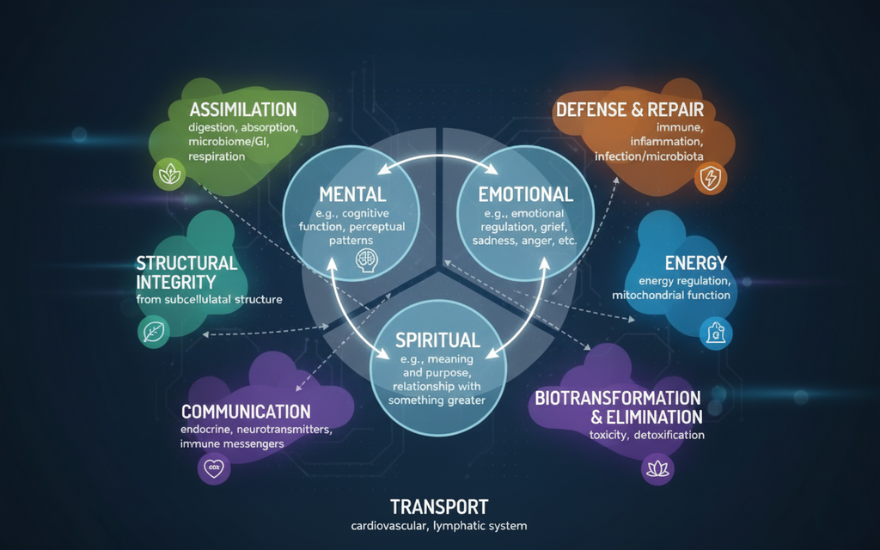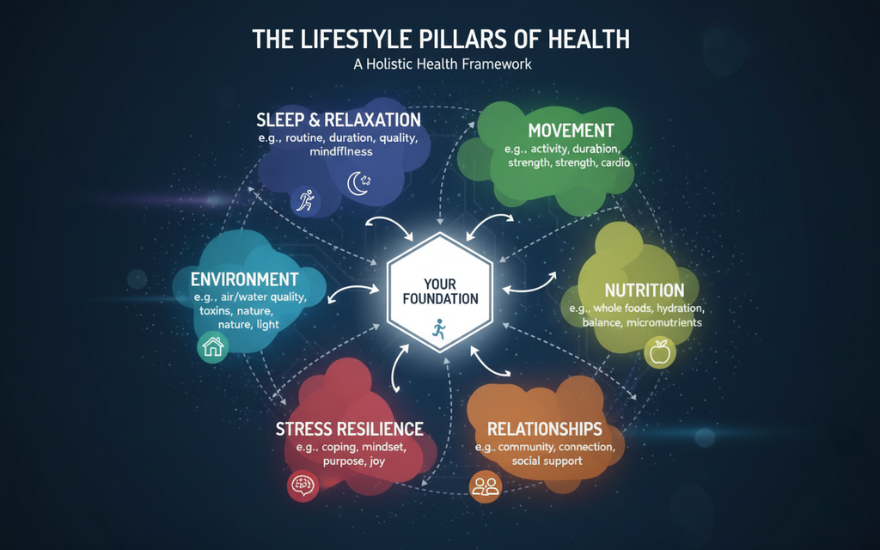- Quick Overview
- Key Insights
- Functional Medicine and How It Finds What Conventional Medicine Misses
- Defining Functional Medicine
- Core Principles of Functional Medicine
- The Role of Nutrition and Lifestyle
- Functional Medicine in Practice
- Why Functional Medicine is Growing in Popularity
- Is Functional Medicine Right for You?
Quick Overview
Functional medicine is a patient-centred, systems-based approach to healthcare that focuses on finding and addressing the root causes of chronic illness, rather than simply treating symptoms. It views the body as an interconnected ecosystem, using tools such as the Functional Medicine Matrix to identify underlying imbalances across biological systems and lifestyle factors.
Through personalised care, advanced diagnostics, and a strong emphasis on nutrition, lifestyle, and prevention, functional medicine aims to restore optimal health and empower patients to take an active role in their recovery. It complements conventional medicine, offering a more integrative and holistic model that is particularly effective for complex, chronic conditions.
Key Insights
- Functional medicine focuses on root causes, not just symptoms. Unlike conventional medicine, it uses a systems-based, patient-centred approach to uncover and address underlying imbalances.
- The body is treated as an interconnected ecosystem. Functional medicine uses tools like the Functional Medicine Matrix to map how genetics, environment, lifestyle, and biological systems interact to affect health.
- Personalised and preventative care is central. No two patients are the same. Functional medicine creates tailored treatment plans based on advanced diagnostics, nutrition, lifestyle, and stress management.
- Nutrition and lifestyle are primary therapeutic tools. Diet, sleep, exercise, and stress reduction are leveraged to restore balance, reduce inflammation, and support the body’s natural healing processes.
- Ideal for chronic and complex conditions. Functional medicine is particularly effective for autoimmune diseases, digestive disorders, hormonal imbalances, metabolic issues, chronic fatigue, and mood disorders.
- Works alongside conventional medicine. It is not alternative but integrative, combining modern diagnostics with holistic, evidence-based interventions for better long-term outcomes.
Functional Medicine and How It Finds What Conventional Medicine Misses
Have you ever felt unwell, burdened by persistent symptoms, only to be told by medical tests that everything is ‘normal’? It’s a frustrating and isolating experience for many, leaving you feeling stuck without answers or a clear path forward. You know something is off, but conventional approaches don’t seem to be getting to the bottom of it.
If this sounds familiar, you’re not alone. The modern healthcare landscape is fantastic at treating acute issues, like a broken bone or a sudden infection, but can often fall short when it comes to the complex, chronic conditions that are so prevalent today. This is where a different approach is needed, an approach that asks not just what is wrong, but why it’s wrong. This is the world of functional medicine.
Defining Functional Medicine
At its heart, functional medicine is a paradigm shift in how we view health and illness. It’s a patient-centred, evidence-based approach that focuses on identifying and addressing the underlying causes of disease. Instead of just managing symptoms, we seek to understand the web of interactions within your body that led to those symptoms in the first place.
The systems biology approach
Understanding what functional medicine is starts with recognising that it’s built on a systems biology approach to health. This means we view the body not as a collection of independent organs, but as one single, integrated system where everything is connected. Think of it like an intricate ecosystem; an imbalance in one area inevitably affects the whole. Your gut health influences your brain, your hormonal balance affects your mood, and your stress levels impact your immune system. We don’t just look at the site of the symptoms; we investigate the entire network to understand how genetics, environment, and lifestyle factors interact to influence your health.

Differences to conventional medicine
The contrast between conventional vs functional medicine lies in the fundamental question each asks. Conventional medicine typically focuses on making a diagnosis and matching it with a corresponding treatment, such as a drug or surgery. It’s a disease-centred model, highly effective for acute care.
Functional medicine, on the other hand, is patient-centred and designed for chronic disease management. It acknowledges that a single diagnosis, like depression, can have many different root causes (inflammation, hormonal imbalance, nutrient deficiencies). Conversely, one root cause, like a compromised gut microbiome, can lead to a variety of different conditions. We use this understanding to provide holistic healthcare that treats the person, not just the disease.
Core Principles of Functional Medicine
To understand how functional medicine works, it’s helpful to explore the core principles that guide every diagnosis and treatment plan.
Root cause analysis
The cornerstone of the functional medicine model is root cause analysis. We act as health detectives, peeling back the layers of your health story to uncover the fundamental imbalances that are driving your symptoms. Why are you experiencing thyroid dysfunction? Why is your immune system overactive? Merely naming the condition isn’t enough. We dig deeper to find the triggers, from hidden infections and food sensitivities to environmental toxins and chronic stress. This allows us to create targeted interventions that resolve the problem at its source.
Personalised and preventative care
In answering the question of what functional medicine is, it’s important to note that there is no ‘one-size-fits-all’ model. Each of us has a unique genetic makeup, a unique health history, and a unique lifestyle. Therefore, each treatment plan must be entirely individualised. This is the essence of personalised medicine. We consider your unique story and biochemistry to create a plan that is right for you.
This approach is inherently proactive. Exploring what is functional medicine shows how it identifies imbalances early on, making it the ultimate form of preventative health. Our goal is not just to resolve your current symptoms but to build a foundation of robust health that serves you for a lifetime.
The Functional Medicine Matrix
To organise all the information from a patient’s story and identify the root causes of their health issues, practitioners use a powerful tool called the Functional Medicine Matrix. This framework helps us see the connections between different aspects of a patient’s life and their health, ensuring a truly holistic assessment. The matrix is built around several key components:

- Antecedents, Triggers, and Mediators (ATMs): These are central to our investigation.
- Antecedents are the factors that predispose you to an illness, such as your genetics or family history.
- Triggers are the specific events that provoke the symptoms, like an infection, a major life stressor, or a new environmental exposure.
- Mediators (or Perpetuators) are the factors that keep the symptoms going, such as ongoing inflammation, poor diet, or lack of sleep.
- Core Clinical Imbalances: We assess seven key biological systems to see where dysfunctions lie. These are:
- Assimilation: Digestion, absorption, and the gut microbiome.
- Defense and Repair: Immune function, inflammation, and cellular repair.
- Energy: How your body produces energy in the mitochondria.
- Biotransformation and Elimination: Detoxification processes in the liver and gut.
- Transport: The cardiovascular and lymphatic systems.
- Communication: Hormones, neurotransmitters, and cell signalling.
- Structural Integrity: The health of your cells, muscles, and bones.
- Fundamental Lifestyle Factors: At the base of the matrix are the lifestyle elements that form the foundation of health. These include sleep, exercise, nutrition, stress levels, and relationships. Imbalances here have ripple effects across all the body’s systems.
By mapping your unique story onto this matrix, we can see the full picture of your health and pinpoint exactly where to intervene for the greatest impact.
The Role of Nutrition and Lifestyle

A key differentiator in functional medicine is its profound emphasis on the power of nutrition and lifestyle to transform health. These are not afterthoughts; they are central therapeutic tools.
Functional nutrition
We’ve all heard the phrase “you are what you eat,” but functional nutrition takes this to a new level. It views food as information that communicates with our cells, influencing everything from our hormones to our gene expression. The food you eat can either fuel inflammation and disease or provide the building blocks for healing and vitality. We use targeted nutritional protocols to lower inflammation, heal the gut, balance hormones, and support detoxification, creating a powerful foundation for recovery.
Movement as Medicine
Exercise is often reduced to a simple equation of calories in versus calories out, but this view misses its profound impact as a biological communicator. From a functional medicine standpoint, movement is medicine. Each step, lift, and stretch sends powerful signals that influence your hormonal balance, reduce inflammation, and even alter your gene expression for the better. The right kind of exercise boosts mitochondrial function—the energy powerhouses of your cells—and stimulates the lymphatic system, a crucial pathway for detoxification. It’s not about punishing your body at the gym; it’s about finding the right movement prescription that supports your unique physiology, builds resilience, and makes your body more efficient at healing itself.
Stress management and sleep
In our fast-paced world, stress and poor sleep have become chronic. Understanding functional medicine helps explain why these are viewed not simply as lifestyle issues but as significant physiological disruptors. Chronic stress dysregulates your hormones and depletes your resilience, while inadequate sleep undermines nearly every system in your body. Effective lifestyle medicine involves implementing practical, sustainable strategies for managing stress and optimising sleep, which are often as critical as any supplement or dietary change.
Functional Medicine in Practice
So, what does this look like when you work with a functional medicine practitioner? It’s a collaborative and in-depth process. To begin, we invite you to explore functional medicine at Agami Health where our focus is on building a comprehensive picture of your health.
Common conditions addressed
While functional medicine can benefit anyone looking to optimise their wellness, it is particularly effective for complex, chronic conditions that often lack clear solutions in the conventional model. These include:
- Autoimmune diseases (e.g., Hashimoto’s, Rheumatoid Arthritis)
- Digestive disorders (e.g., IBS, SIBO, IBD)
- Hormonal imbalances (e.g., PCOS, endometriosis, menopause)
- Metabolic issues (e.g., insulin resistance, type 2 diabetes)
- Chronic fatigue and fibromyalgia
- Mood disorders (e.g., anxiety, depression)
Functional testing and diagnostics
To guide our root cause analysis, we often use advanced functional lab testing. Unlike standard blood tests that look for overt disease, these specialised tests assess how well your body’s systems are functioning. They provide detailed insights into your unique physiology, looking at everything from hormone metabolites and gut bacteria to nutrient levels and toxic load. This data allows us to move beyond guesswork and create a precise, targeted treatment plan.
Why Functional Medicine is Growing in Popularity
The shift towards functional medicine is being driven by patients who are seeking more than just a prescription to mask their symptoms. Pioneers in the field, like Dr Mark Hyman, and leading institutions, such as the Institute for Functional Medicine (IFM), have brought this powerful approach to a wider audience.
Patient-centred care models
At its core, functional medicine is a partnership. A patient-centred care model means your story is heard, your experiences are validated, and you become an active participant in your own healing journey. Appointments are longer and more detailed, allowing for a deep dive into your health history and goals. This collaborative approach is empowering and leads to far better, more sustainable outcomes.
Integrative healthcare collaboration
Functional medicine is not “alternative” medicine; it is a form of integrative medicine. It respects the value of conventional treatments and works alongside them. We see it as the evolution of medicine, one that integrates the best of conventional diagnostics with a deeper understanding of nutrition, lifestyle, and systems biology. This holistic healthcare approach provides a more complete and effective path to wellness.
Is Functional Medicine Right for You?
If you’re struggling with a chronic health issue, feel your symptoms are being overlooked, or want to go from surviving to thriving, exploring what functional medicine is may provide the solution you’ve been searching for. It’s ideal for those who are ready to take an active role in their health and are looking for a partner to guide them toward root-cause resolution and lifelong vitality.
At Agami Health, we are dedicated to uncovering the underlying factors affecting your wellbeing and creating a clear, personalised path to optimal health. Book a discovery call today to speak with our expert and take the first step toward lasting transformation.
